Iran's Air Force Commander Threatens Israel With 50-Year Old Jets
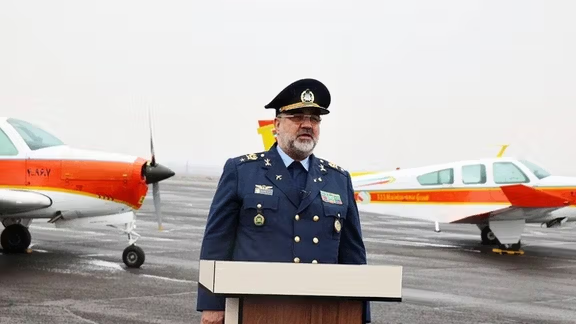
Hamid Vahedi, the commander of Iran’s Army Air Force, says forces are ready to execute orders, using the Soviet-era Sukhoi Su-24 bombers against Israel.

Hamid Vahedi, the commander of Iran’s Army Air Force, says forces are ready to execute orders, using the Soviet-era Sukhoi Su-24 bombers against Israel.
"We are ready to strike our targets with Sukhoi 24," Vahedi declared, the Sukhoi Su-24 first entering service in 1974. It remains a component of Iran's limited fleet of strike aircraft, which includes several aging models from both the US and Russia.
Vahedi's comments follow Iran's air strike against Israel over the weekend when over 350 missiles and drones were fired towards Israel, most of which were intercepted by Israel and its allies.
Tehran says its attack was in response to an earlier incident on April 1, where Iran’s consulate in Syria was attacked by an alleged Israeli air strike, killing a senior Quds Force commander and several IRGC personnel.
Despite the tone of Vahedi’s warnings, his remarks have sparked a flurry of jokes, with many commenting on the antiquated nature of the Su-24 bombers still in service.
Currently, the Islamic Republic of Iran Air Force operates around 30 Su-24MKs, a fleet acquired from Iraq during the 1991 Gulf War and potentially other post-Soviet states.
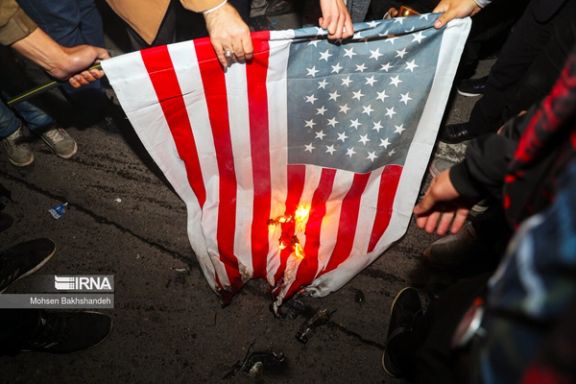
As the Iranian government pressures critics to endorse its missile and drone strikes on Israel, Iranians abroad and some activists within Iran oppose Tehran’s ideological stance on the regional conflict.
Hundreds of Iranian political activists have expressed concern about the possibility of a widespread war in the region and called on Iranians to voice their opposition to Iran's involvement in such a war.
A statement they issued by activists pointed out that while Iran is facing multidimensional economic, political, and social crises, the escalation of tensions with Israel will impose more authoritarian measures in Iran. The regime's lack of accountability in this and other crises paves the way for further suppression of protest movements in Iran.
The signatories are mainly foreign-based reform minded individuals, as opposed to those advocating regime change. They represent various political affiliations including human rights activists, former political prisoners and advocates of civil rights and social equality.
"In an atmosphere in which the Islamic Republic's repressive policies and non-democratic and inefficient foreign policy is dragging the country into an all-out war, we call on everyone to distance themselves from warmongering and call for protests to exert pressure on the government."
A tougher statement by the trade Union of Students in Iran "condemned the Islamic Republic's warmongering" and said: "The people of Iran are at war with the Islamic Republic and call for the victory of Woman. Life Freedom movement as well as calling on foreign government to put Iran's revolutionary guards on their terror list.
Meanwhile, a Statement released by the Association of the Families of Flight PS572 Victims, a passenger flight downed by the IRGC in 2020 killing over 170 civilians, also condemned "the Islamic Regime’s warmongering," arguing that the Islamic regime and the IRGC think only of their own survival and continuation of their reign of power.
The statement added that "The Islamic regime has put Iran and millions of Iranians in danger of war with a shameless disregard for their safety and security." It added: "The world needs to stand up to the war mongering policies of the Islamic Republic regime, designate the IRGC in the list of terrorist organizations, bring to justice all regime officials who commit crimes against the people of Iran, and support Iranian civil society to overcome this brutal regime."
On official media and platforms inside Iran, it is all praise for the attack and Supreme Leader Ali Khamenei as its commander. Tehran's firebrand Friday prayers imam Ahmad Khatami on Tuesday said, "the attack was an honor for the Iranian armed forces who have a commander such as Khamenei." He added that although some people tried to scare the nation about Israel's reaction, Israel has not been able to do anything.
Meanwhile, former reformist President Mohammad Khatami, in what appeared to be a stage-managed statement, stated that Iran's attack on Israel was “thoughtful, brave, and legitimate." Khatami further stressed that "Protecting the region and Iran's security is a priority for the Islamic Republic."
He added that the message of Iran's attack on Israel was that Israel should not think that it can do anything without fearing the consequences of what it does.
Iranian journalist Naimeh Doustdar commented that "Khatami has shown his true face while he should have at least kept silent and not add to his bad records." She reminded Khatami that "All wars are hateful, and no decent individual can have a positive attitude toward war." Doustadar further accused Khatami of not thinking about Iran's future.
Meanwhile, in a move that shocked many Iranians, human rights activist Nasrin Sotudeh said in a statement posted on social media praised Tehran’s attack on Israel and condemned Israel’s April 1 bombing of a building in Damascus that killed two senior IRGC generals, precipitating the current tensions.
In another development, Hossein Dehbashi, one of the Iranian journalists who came under pressure by the Prosecutor's Office for writing a critical post about Iran's attack on Israel, wrote a new defiant tweet: "People like me have not learned their faith and religion from the clerics. So, we will not lose our faith by seeing their mistakes and negligence."
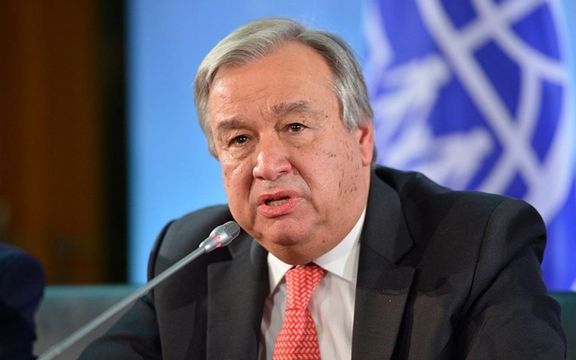
United Nations Secretary-General Antonio Guterres urged the urgent de-escalation in the Middle East in a call with the Iranian foreign minister on Tuesday, urging "maximum restraint".
It comes on the back of Iran's aerial bombardment of Israel over the weekend in which over 350 drones and missiles were launched towards the Jewish state.
"The secretary general's position is one he stated very clearly on Sunday in his call for maximum restraint," said Stephane Dujarric, spokesperson for the Secretary-General, during a press briefing. "We do not want to see another cycle of eye for an eye, which is not a policy that will lead to peace."
The aerial assault followed an alleged Israeli air strike on the Iranian consulate earlier this month in which a senior Quds Force commanders was killed along with several IRGC personnel.
Dujarric added that on Monday, Guterres also was in touch with Israeli President Isaac Herzog and other Israeli officials. The Secretary-General has called for de-escalating tension and reorienting efforts on the peace front in the region.
The Israeli military said 99 percent of the aerial threats were intercepted by an operation with a US-led coalition of partners.
Israel has also expressed its intention to retaliate against the assault, which its military chief was too severe to leave unanswered. "Iran will face the consequences for its actions", said Hertzl Halevi, chief of the general staff, earlier this week.
The UN's calls also come amid criticism that the body has allowed Iran to chair its disarmament conference, while Iran not only bombards Israel and funds terror proxies across the Middle East and beyond, but also supplies drones to Russia in its offensive against Ukraine.
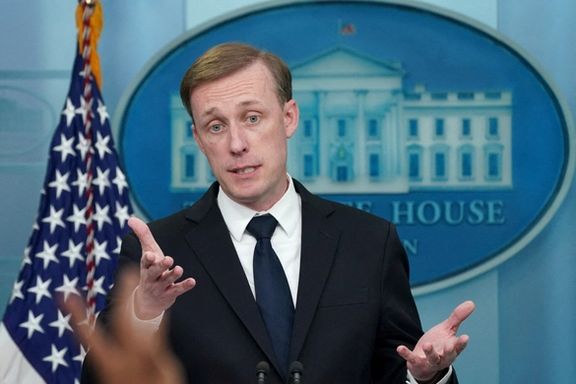
The US and the European Union plan to expand their sanctions regimes against Iran, following Tehran’s unprecedented missile and drone attack on Israel.
In the coming days, the US will impose sanctions on Iran's missile and drone programs, as well as on entities that support the Islamic Revolutionary Guard Corps (IRGC), and the Defense Ministry, according to Jake Sullivan, the National Security Adviser at the White House.
“We anticipate that our allies and partners will soon be following with their own sanctions," said Sullivan.
The European Union’s top diplomat Josep Borrell says the bloc is preparing its sanctions in response to Tehran’s attack, after an emergency video conference of foreign ministers.
Germany, France and several EU members have publicly backed a proposal to expand the sanctions regime, seeking to curb the supply of Iranian drones to Russia to include the provision of missiles and cover deliveries to Iranian proxies in the Middle East, Borrell said.
Borrell said he supported the proposal and diplomats would work on it in the coming days so ministers could discuss it again at a meeting in Luxembourg on Monday.
Critics of the US response meanwhile, say Washington is refusing to snap back UN sanctions against Iran’s missile and drone program – which they argue would impose a serious cost on Tehran.
Others argued that Washington’s response is performative and avoids pressuring Tehran.
“If they keep the cash flowing to the regime, avoid snapback, and allies don’t designate the IRGC as a terrorist organization, we will know this is more of a media stunt than a pressure track,” said Foundation for Defense of Democracies Senior Adviser Richard Goldberg on X.
IRGC Terrorist Designation
While Borrell mentioned that some EU members raised the prospect of sanctioning Iran's elite paramilitary, the Islamic Revolutionary Guard Corps, he reiterated the EU's position that the IRGC could only be designated as a terrorist organization if an EU national authority found that the group had engaged in terrorist activities.
This, however, widely disputed by numerous experts who say that there is no shortage of evidence, admissible under the EU’s process, to designate the IRGC as a terrorist group.
Borrell said the EU was not aware of any such case, but he would ask the EU's diplomatic service to examine the matter again.
This has been Borrell’s position since calls grew louder in 2022 and 2023, amid the IRGC’s brutal crackdown on anti-regime protests in Iran – killing at least 500 protesters, including children.
The IRGC’s role in sending weapons to Russia for its illegal invasion of Ukraine has also been cited by experts, as another reason to proscribe the paramilitary entity.
While the Iranian authorities targeting of dissidents and opponents abroad has been occurring for decades, recently, Tehran has also been taking aim at Jews in Europe.
In December, a German-Iranian man was sentenced by a German court to nearly three years in jail for attempting to firebomb a synagogue in the city of Bochum on behalf of the Iranian government in November 2022.
In addition, there have been foiled assassination attempts on UK-based Iranian journalists.
UK Prime Minister Rishi Sunak is facing cross-party pressure to proscribe the IRGC, after Tehran’s attack on Israel over the weekend.
Canadian Prime Minister Trudeau is similarly being urged to follow through with his 2018 commitment to vote in support of listing the IRGC. In January, marking the four-year anniversary of the IRGC's shootdown of Flight PS752, Trudeau stated that his government was exploring ways to designate the Guards.
Iran’s Ability To Export Oil
This week US Treasury Secretary Janet Yellen hinted at new sanctions against individuals and networks financing terrorism and supplying arms, rather than enforcing existing US oil export sanctions.
When asked about Iran's continuing oil exports despite US sanctions, Yellen replied, "We have been working to diminish Iran's ability to export oil...There may be more that we can do."
Iran sells around 1.3 million barrels of crude oil daily – mainly to China.
Borrell meanwhile said all the ministers from the 27-nation EU strongly condemned the Iranian attack and reaffirmed their commitment to Israel's security.
The diplomat also voiced strong criticism of Israel's conduct of the war in Gaza, launched in response to the Hamas attack on Israel from the Palestinian enclave on October 7 last year.
"Today, ministers took a strong stance, asking all actors in the region to move away from the abyss, in order not to fall into it," Borrell told reporters after the meeting, called to discuss the repercussions of the Iranian attack.
Borrell warned that the Middle East would be in "full war" if every development in the current crisis is followed by an escalation.

In a recent off-the-record meeting, US Secretary of State Antony Blinken told American Jewish leaders Israel's response to Iran's Saturday night aerial bombardment should be "limited".
According to Axios, quoting a person who attended the meeting, Blinken said that escalating the conflict between Israel and Iran serves neither Washington nor Jerusalem's interests, and advised that any Israeli response to Iranian aggressions should be "smart, strategic, and as limited as possible."
The guidance follows reports of President Joe Biden assuring Israeli Prime Minister Benjamin Netanyahu that while the US will defend Israel from attacks, it will not support or engage in an Israeli attack on Iran.Biden has long been branded soft on Iran. During his tenure, Iran has accelerated its nuclear program, sold drones to Russia for its war on Ukraine, and embarked upon a nationwide crackdown on human rights. Hundreds were executed last year amid the worst uprising against the government since the founding of the Islamic Republic.
Over the weekend, Iran initiated an unprecedented attack on Israel, launching over 350 drones, ballistic missiles, and cruise missiles. This marked the first attack of its kind by Iran. The assault was expected as it followed Iran's promise to retaliate against Israel for an air strike on the Iranian consulate in Damascus on April 1 which killed two Quds Force commanders and several IRGC personnel.
The defensive operation saw Israel joined by the US, UK, Jordan and France in a night in which 99 percent of the onslaught was intercepted.
The meeting with Jewish leaders from across the US also touched on the role of Hamas in the ongoing tensions. Blinken said Hamas declined the latest hostage deal offer, anticipating that the recent Iranian strike would trigger a wider conflict. However, with a larger regional escalation now seeming unlikely, Hamas might feel pressured to reconsider negotiations.
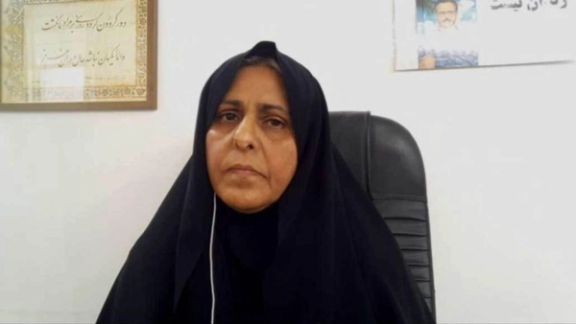
Fatemeh Sepehri, an Iranian political prisoner and outspoken critic of Supreme Leader Ali Khamenei, has been subjected to psychological torture by a judiciary psychiatrist.
Fatemeh Sepehari's brother says that Iran's judicial authorities organized a virtual meeting in Mashhad's Vakilabad prison with the presence of a "psychological interrogator", who asked her questions about her childhood.
Emphasizing that "this person refused to tell my sister his name", Asghar Sepehri wrote on X: “She is in an abysmal mental state after the session”.
The political prisoner has been imprisoned since September 21, 2022 during the Women, Life, Freedom protests. Despite her illness and several operations, including open heart surgery, she remains in confinement.
Sepehri faces severe charges, including "collaboration with hostile countries" resulting in a ten-year sentence, "conspiracy and collusion" resulting in five years of imprisonment, "insulting the leadership" resulting in two years of imprisonment, and "propaganda against the system" resulting in one year of imprisonment.
Earlier in April the judiciary opened a new case for her with the charge of "supporting Israel" after she condemned the atrocities committed by Iran-backed Hamas on October 7 which triggered a proxy war in the region.






